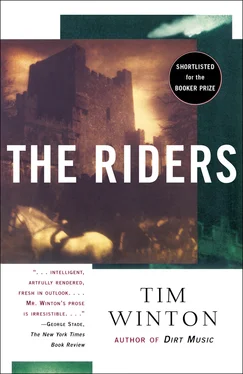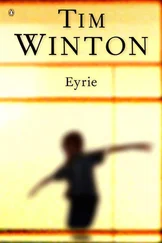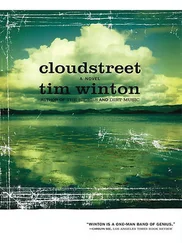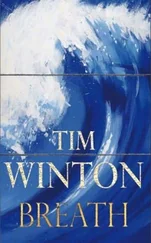‘I’m not really into dolls,’ called Billie, standing precariously close to the edge. ‘But I’m glad you tried.’
Scully hung there panting, the sweat cold on him already. He hated this town.
• • •
THE RUE JACOB WAS SLUSHY with thawing ice. Scully struggled in through the courtyard door to the quiet world of Dominique’s garden. Cypresses, sunning benches. Banks of tall elegant windows and Romeo and Juliet balconies. At the foyer he buzzed her floor and got nothing. It was early still. He buzzed again, waited a few moments without result. Then he leant on the button half a minute or so, feeling his hopes ebbing. All day yesterday she hadn’t answered. Last night again. But that call at Marianne’s. Where was she? Wherever she was, Marianne would have called her. Told her God knows what.
In her mail slot there were bills and a plastic-wrapped copy of Photo-Life. He looked at Billie who avoided his gaze. Her nose was rosy, her cap askew. He peered at the postmarks. Yesterday, the day before. She wasn’t in Paris at all.
He stabbed the button for the apartment next to hers.
‘Allo. Oui?’
‘Er,’ he stammered. ‘ Excuse moi, Madame, je… chercher Mlle Latour.’
In the long pause Scully felt his accent, his foreignness sinking in upstairs, and he knew he was probably buggered.
‘Qui? Qui es la?’
‘Je m’appelle Fred Scully, un ami. Je suis Australien.’
Australie?’
Then the woman spoke quickly, too quick for him to understand, and all he really heard was ‘le train ’ and then she signed off sharply and he could get nothing more from her. He hammered the button till his fingertip throbbed. The train? That definitely didn’t mean the Metro. Where would she go by train? What did it matter anyway. She wasn’t here. No help. He still needed money. He couldn’t go back to Marianne. Maybe Jean-Louis, but he’d be at work now, and besides who knows what Marianne had told him. Fat chance there. In a whole city, somewhere he’d lived the better part of a year there was nobody. Not a soul. It was hard to believe. He was water off a duck’s back.
That left American Express. Or the embassy. Way to go.
Out in the street a lonely Japanese tourist beckoned for him to take a photo in front of some statue, but Scully waved the camera aside and dragged Billie toward the nearest Metro.
Underground the city was surging, pressing, breaking into a jumbled run, thick with mittens, caps, greatcoats, mufflers and a foetid steam of damp and overheated wool. The tunnels were sweet and septic, echoing with shouts and the march of feet. A saxophone mooned around some corner. Stalls of flowers, their colours crazy and shocking down here in the monochrome blur, erupted at intersections where masses of bodies merged like forks of the khaki river above.
Scully stepped over men with scrawled cardboard placards, around women with swaddled babies and rattling cups. In a corner by the paper shop the Flics bailed up an Arab and snatched at his papers. Scully steered Billie down to the platform as a train came gushing out of the darkness on a blast of dry, stale air.
• • •
AS THE CARRIAGE HURTLED THROUGH the dark, a gypsy child made her way through the crowd with a small leather purse held open, her voice chirruping gaily down the aisle. When she came to Scully he closed his eyes against her and smiled faintly. She moved to Billie who stared uncertainly at her and then down into the purse. The gypsy child knelt daintily, her black eyes upturned, and Billie reached out and touched her hair. Scully shook his head, still smiling. The train braked hard and wheezed into the next station and the girl stood up, shrugged, smiled brightly at them, and made for the doors.
‘I liked her,’ said Billie as they careered off again.
Scully nodded, preoccupied.
‘Was that begging?’
‘I guess.’
‘She didn’t look poor.’
Not as poor and raggedy as us, he thought, and that’s for bloody certain.
‘I could do that,’ she murmured. ‘If I had to. To get us home.’
They bumped snugly on, legs pressed to one another, their wiry curls bobbing enough to catch the eyes of other passengers who exchanged small smiles at the sight.
The train, thought Scully. Dominique caught the train. She had a house on the Isle of Man, houseboat in Amsterdam. You didn’t catch a train to the Isle of Man. Well, good luck to her.
• • •
UP IN THE STREETS AROUND the Opera the air was still and a faint sun caught in brass door trims, on the panels of turning buses. It lit the flowing breaths of shoppers as they strode four deep along the pavement; it caught coffee cups, boot heels, earrings; it wrought glory and fire amidst the gilt statuary above the Opera itself and forced a beauty upon the crowded streets lined with oyster stalls and the outlandishly decorative carcasses of pigs and half-plucked poultry. Scully navigated the crush past wine cellars, brasseries, airline offices. He held Billie in against his hip and found the building.
At the Amex entrance he felt the hot gust of conditioned air and smelled perfume, leather, money. The armed guards frisked him gently and patted Billie down in jovial Christmas spirit. A poster of Karl Malden’s beaming benevolent face looked down on them. That turnip nose — Scully recognized a brother there.
Inside was a calm civilization. Floors of it. There were slick counters and windows, glossy rails, armchairs. People queued thoughtfully or sat with folders and umbrellas in their laps as though they’d come inside simply for refuge. Midwesterners in checkerboard slacks, and chinos. Golfing shoes, pork pie hats, customized baseball caps. Women in nylon slacks and virginal Nikes, their hair hard with spray, quilted jackets thrown across their knees. Camcorders swung at hip level.
He’d come here before to change money, and collect rent wired from Fremantle every month. Each time he wondered if the miracle would fail, whether the money would somehow evaporate in the wires, and the hieroglyphs on his plastic card lose their power. He envied these cologned businessmen browsing in the merchandising department, signing cheques and releases with their Mont Blanc pens. They had faith. They were certain of their rating, their status, their on-bookings and connections. They spoke in the plangent tones of the righteous and unselfconscious. There was nothing apologetic about their English or their requests.
Scully went down the spiral staircase, avoiding the sight of himself in the field of mirrors, and sloped across to the customer service desk.
The clerk was cool and sympathetic, his English precise, his tailoring exquisite. Scully tried not to think of the figure he himself cut. The man was doing his utmost professional best not to look suspicious or disdainful, but Scully could see his resistance to the story. He repeated it all calmly.
‘Before anything else,’ he said, ‘I’d like to know who reported it stolen.’
‘Of course you have some identification, sir.’
Scully laid his passport on the counter. The blue seriousness of it, the emu and kangaroo of the coat of arms were not reassuring.
‘Hmm.’ The clerk fingered it and clacked on his keyboard. ‘You have another signatory to this account, sir, do you not?’
‘Yes, my wife. J. E. Scully. We share it in my name. Not very modern, I guess.’
‘According to records, sir, it was you who reported this card stolen.’
Scully hopped from foot to foot. ‘Well. Well, as you can see, it’s right here in my hand.’
‘In two pieces, monsieur.’
Scully swallowed. ‘Yes.’
‘Well. I believe we can fix this problem. Hmm.’ The clerk clacked a little further, narrowed his eyes unpleasantly.
Читать дальше












